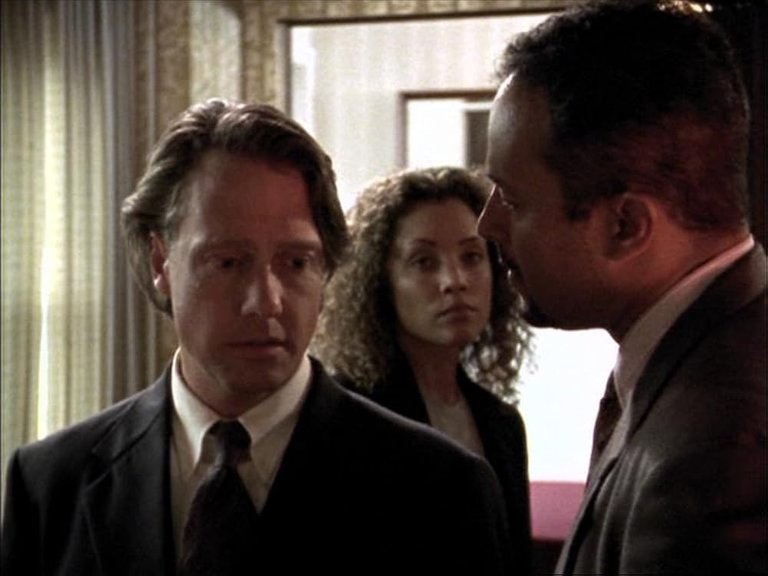Television Review: Brotherly Love (Homicide: Life on the Street, S7X02, 1998)

Brotherly Love (S07E02)
Airdate: 16 October 1998
Written by: Julie Martin
Directed by: Peter Medak
Running Time: 44 minutes
Following the disappointingly predictable and lacklustre premiere of Homicide: Life on the Street’s seventh season, the series continued its precipitous decline with Brotherly Love, an episode that further eroded the show’s once-sturdy reputation as a gritty, character-driven police procedural. Once anchored by David Simon’s unflinching portrayal of Baltimore’s underbelly, the programme now seemed intent on trading its hard-boiled realism for melodramatic soap opera tropes.
The episode’s primary storyline revolves around the murder of David Ralston (Michael Liechtenstein), investigated by Detectives Lewis and Shepard. The victim’s identical twin brother, Adam (also played by Liechtensein), becomes the central suspect, with the duo discovering that the brothers’ lives were characterised by an unsettling obsession with uniformity. From sharing clothing to meticulously mirroring each other’s appearance, their relationship bordered on the pathological, with acquaintances even hinting at incest. This bizarre dynamic—reminiscent of the surreal, Lynchian absurdity of Twin Peaks—felt jarringly out of place in a show rooted in the grim realities of urban homicide. The motive, as so often in the series’ later seasons, hinged on a romantic triangle: David’s girlfriend, Susan Dehen (Collen Deleney), forced Adam to endure the humiliation of staying at his overbearing mother’s (Phyliss Sommerville) house during their dates. Yet the script’s resolution offered little suspense, as Adam confessed under emotional duress, framing the murder as a jealous outburst over his brother’s “success” with women. The lack of credible evidence or psychological depth rendered the case more clichéd than compelling, underscoring the writers’ reliance on melodrama over substance.
The secondary plot followed Detectives Ballard and Gharty investigating the death of a young man who bled to death after a meth-related altercation in Washington, D.C. The victim’s friend, Dean Stamper (Zach Gregger), revealed the pair had fled to Baltimore to avoid drawing attention to their illegal activities. The case became a jurisdictional quagmire, with neither Baltimore nor D.C. police eager to take responsibility. Enter Detective Joe Landrewsky, a D.C. narcotics officer played by Aerosmith’s Joe Perry—a casting choice so tone-deaf it bordered on crass. Perry’s wooden delivery and lack of chemistry with seasoned actors like Peter Gerety (Gharty) made his scenes cringe-worthy, undermining the otherwise plausible tension between interdepartmental bureaucracy. The subplot’s potential for darkly comic institutional satire was squandered by such missteps, though Gharty’s subplot—his admission of leaving his wife post-recovery from a shooting—added a faintly humanising note. His midlife crisis, however, felt tacked-on, a cheap narrative device to fuel future “soap opera” flirtations with female colleagues.
The episode also cemented Mike Giardello’s transition to FBI liaison, a move met with gleeful vindictiveness from Captain Gaffney, who relished pitting the estranged son against his father, Lt. Giardello. While this dynamic held promise for exploring familial tension and professional rivalry, the execution felt rushed, serving more as a contractual obligation to Giardello’s character than a meaningful narrative thread.
Veteran director Peter Medak lent the episode a polished visual sheen, but his efforts were hamstrung by a script that recycled tired tropes. The main plot’s “twins and trauma” angle was neither fresh nor particularly unsettling, while the resolution—a confession prompted by a melodramatic standoff—lacked the moral complexity that once defined Homicide’s character-driven storytelling. The show’s shift toward prioritising sensational personal drama over procedural rigor was glaring, particularly in the Bayliss subplot, where the lieutenant’s newfound bisexuality and interest in Shepard threatened to reduce the latter to a love-interest pawn. Such contrivances smacked of desperation, as if the writers believed audiences would prioritise tabloid-style intrigue over the show’s original mission.
Brotherly Love epitomised Homicide’s seventh-season nadir, trading its gritty realism for melodramatic clichés and celebrity cameos. While the D.C. storyline briefly hinted at institutional satire, its potential was drowned out by Joe Perry’s ill-advised presence, while the main plot’s soap-operatic twists underscored a creative team running out of ideas. By the time Brotherly Love aired, the show’s slow-motion collapse into irrelevance was irreversible—a tragic end for a once-great television institution.
RATING: 4/10 (+)
Blog in Croatian https://draxblog.com
Blog in English https://draxreview.wordpress.com/
InLeo blog https://inleo.io/@drax.leo
LeoDex: https://leodex.io/?ref=drax
Hiveonboard: https://hiveonboard.com?ref=drax
Rising Star game: https://www.risingstargame.com?referrer=drax
1Inch: https://1inch.exchange/#/r/0x83823d8CCB74F828148258BB4457642124b1328e
BTC donations: 1EWxiMiP6iiG9rger3NuUSd6HByaxQWafG
ETH donations: 0xB305F144323b99e6f8b1d66f5D7DE78B498C32A7
BCH donations: qpvxw0jax79lhmvlgcldkzpqanf03r9cjv8y6gtmk9